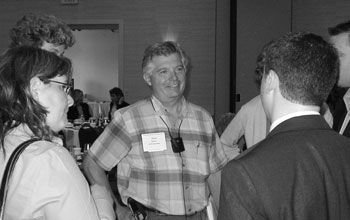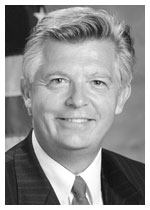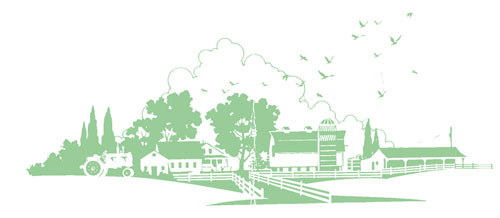|
Rural New York Visioning
|
 Assemblyman David Koon, Vice Chair of the Legislative Commission on Rural Resources,
talks with participants at the Future of Rural New York Symposium held in July.
Assemblyman David Koon, Vice Chair of the Legislative Commission on Rural Resources,
talks with participants at the Future of Rural New York Symposium held in July.
|
The NYS Legislative Commission on Rural Resources has been working with Cornell
University on a collaborative project to develop a vision for rural New York’s future.
The partners include Cornell’s Community & Rural Development Institute (CaRDI),
the Department of Development Sociology’s Rural New York Initiative (RNYI), Cornell
Cooperative Extension, and the Commission. The project goals are: creating a common
vision of rural New York; fostering a productive dialogue among stakeholders that include
academics, state and local government officials, business owners, healthcare providers,
farmers, and other concerned citizens; and strengthening and improving policies that
promote vibrant growth in New York’s rural areas.
This year, Cornell and the Commission conducted 11 listening sessions with over 300
participants across the state as the first phase in the visioning project. The sessions
were a way of bringing interested parties together to discuss and gather information on
some of the unique issues facing rural areas. Because rural areas have such diverse
needs, the sessions divided participants into theme areas that included: rural economic
development; workforce development; agriculture and food systems; land use, environment
and natural resources; rural healthcare; housing and transportation; local and regional
governance; energy; rural schools and youth; community capacity and social networks;
and poverty. Each group shared information, identified challenging issues and opportunities,
discussed local, regional, and state-level policies that work, identified policies and programs
that needed improvements, and made recommendations for new initiatives.
In July of this year Cornell and the Commission sponsored another major component of the
rural visioning project, the Future of Rural New York Symposium. The goal of the July Symposium
was to build upon the information gathered at the listening sessions and formulate policy and
program proposals in each theme area, with recognition of the inter-connectedness of many issues.
The Symposium brought together more than 175 participants from agriculture, the business community,
schools, healthcare, local agencies, state agencies, Cornell Cooperative Extension, and Cornell faculty.
Participants were again divided into small working groups covering the theme areas for more in-depth
discussions. Legislators from the Rural Resources Commission chaired 10 theme area workgroups
and a panel discussion of the workgroup proposals. The results of the Symposium will be incorporated
into a report covering the entire project.
The Symposium recommendations included:
-
using schools as community centers;
-
providing incentives for local government partnering and consolidation;
-
promoting a State focus on wellness and disease prevention;
-
providing incentives to landlords for affordable housing;
-
developing an inventory of renewable energy resources and markets; and,
-
improving connections between agriculture and communities to improve health
and farm profits.
The final visioning project report and recommendations will be a valuable tool for the Commission as
they develop their legislative agenda for the coming legislative session. For more information on the
Rural New York Initiative, including the report, please visit the website at: http://rnyi.cornell.edu or
call CaRDI (607-255-9510) or the LCRR (518-455-3999).
Rural Resources Legislative Highlights
Over two dozen wide-ranging bills were sponsored by the Commission this year. Highlights
include legislation that would:
-
A.5480 (Koon)/S.2618 Provide matching
grants to cluster-based industries and agribusinesses, such as wine and grape or bio-fuel
crops and production, under the rural revitalization program of the New York State Urban
Development Corporation, for the purpose of increasing and/or retaining employment
opportunities and contributing to the growth or revitalization of rural areas — passed
Assembly;
-
A.5633-C (Koon)/S.2747-C Direct the
Department of Economic Development to recommend alternative financial and other
incentives and programs to hasten the expansion and deployment of broadband services
for economic development in underserved, rural areas — signed by the Governor, Chapter
295 of the Laws of 2006;
-
A.8155-A (Koon)/S.7324 Authorize the
Charles D. Cook Office of Rural Health to conduct a study of employment incentive options
to attract physicians to underserved, rural areas — passed both houses, awaiting action by
the Governor;
-
A.9995-A (Koon)/S.6767-A Adds a definition
of “agricultural tourism,” which includes activities such as apple festivals or wine tours, to the
Ag & Markets Law listing “sound agricultural practices,” which are protected from
nuisance lawsuits — passed both houses, awaiting action by the Governor;
-
A.10194-A (Koon)/S.6940-A Eliminate
the limitation on the dollar amount a town may pay to a landowner in the event their land
is taken for the purpose of improving or discontinuing a highway. Existing limitations were
put in place in 1936 —passed both houses, awaiting action by the Governor;
-
A.10891-A (Gunther)/S.7718-A Authorize
registered physician’s assistants and certified nurse practitioners to supervise the withdrawing
of blood for the purpose of conducting a blood alcohol test in hospital emergency rooms. In rural
areas, these health professionals are often the only staff on duty in emergency rooms. — passed
both houses, awaiting action by the Governor; and
-
A.11606 (Koon)/S.7581 Create a dedicated fund
within the State Department of Transportation (DOT) for funds received from the rental of their
machinery to municipalities who may only need such equipment temporarily. The funds would be
used for the repair and maintenance of the DOT equipment. Currently the funds cannot be kept by
DOT — passed the Assembly.
|


 Assemblyman David Koon, Vice Chair of the Legislative Commission on Rural Resources,
talks with participants at the Future of Rural New York Symposium held in July.
Assemblyman David Koon, Vice Chair of the Legislative Commission on Rural Resources,
talks with participants at the Future of Rural New York Symposium held in July.
